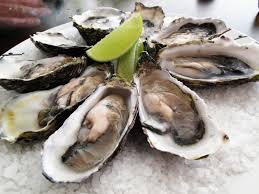记忆方法
将“oyster”与“o”形状结合记忆。想象一个“o”形状的耳朵(就像海星),它把“yster”当做宝贝(oyster),从而帮助记忆这个词汇表示“牡蛎”。
以上内容由AI生成, 仅供参考和借鉴
中文词源
oyster 牡蛎
来自古法语oistre,来自拉丁语ostreum,牡蛎,来自PIE*ost,骨头,词源同ossify,osseous.
英语词源
- oyster
-
oyster: [14] The Greek word for ‘oyster’ was óstreon – etymologically an allusion to its shell. It came from a prehistoric Indo-European base *ost- denoting ‘bone’, which also produced Greek ostéon ‘bone’ (source of the English prefix osteo-), ostakós ‘crustacean’, and óstrakon ‘shell, piece of broken pottery’ (source of English ostracism). Óstreon passed into Latin as ostrea, and from there came by way of Old French oistre into English as oyster.
=> osteo - oyster (n.)
- early 14c., from Old French oistre (Modern French huître), from Latin ostrea, plural or fem. of ostreum "oyster," from Greek ostreon, from PIE *ost- "bone" (see osseous). Related to Greek ostrakon "hard shell" and to osteon "bone."
Why then the world's mine Oyster, which I, with sword will open. [Shakespeare, "The Merry Wives of Windsor," II.ii.2]
权威例句
- 1. Fishermen fear valuable oyster and mussel beds could be decimated.
- 渔民们害怕宝贵的牡蛎和贻贝层会被破坏。
- 2. Oyster beds, on the mudflats, are a form of fish farming.
- 滩涂牡蛎养殖场是一种水产养殖方式。
- 3. I enjoy eating oyster; it's really delicious.
- 我喜欢吃牡蛎, 它味道真美.
- 4. The world is sb .'s oyster.
- 人生最得意[最有前途]的时刻.
- 5. You're young, you've got a lot of opportunity. The world is your oyster.
- 你还年轻,机会有的是。世界是属于你的。
